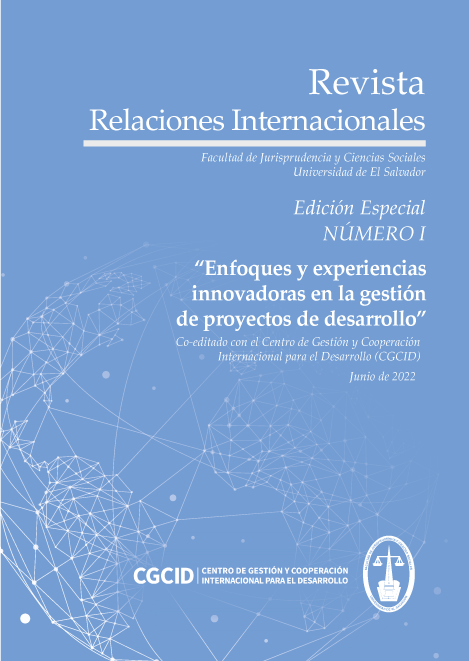The soft skills in management of development cooperation projects
Keywords:
Soft skills, Competencies, Project management, Cooperation for development, Interpersonal abilities.Abstract
The objective of this article is to determine soft skills as a factor for success in project management of cooperation for development in six departments of El Salvador. In order to achieve the objectives, the theoretical bases used were the Project Manager competency development framework developed by the Project Management Institute, authors of organizational behavior, and articles of journals of high scientific impact in project management were used. The methodological framework was focused on an epistemological approach of positivist or quantitative paradigm. The type of research was descriptive, non-experimental and transectional. The instrument for data collection was a survey. The population were 72 professionals with a sample of 65 project management professionals that will share their experiences at the time to evaluate the soft skills necessary to the success of the intervention as in their project manager or its collaborators. The results showed the prevalence of soft skills inside the personal competencies necessary for the success of an intervention, accompanied by the interpersonal skills key in the acquisition of these competencies, also the implicit role that these play in the development of those intervention and the impending necessity of an extensive formation in soft skills.
Downloads
References
Alles, Martha. Desarrollo del talento humano basado en competencias. Buenos Aires: Gránica, 2006: 27.
Alvarenga et. al. “The project manager core competencies to project success”. International Journal of Managing Projects in Business. 2020: 277-292
Bosley, Deborah. “The impact of “soft skills” in the information-knowledge management economy and the UNC system”. UNC GA Academic Planning: UNC Voluntary Accountability Plan and Perfomance Measure. (2007): 3
Clarke, Nicholas. “Emotional Intelligence and its relationship to transformational leadership and key project manager competences”. Project Management Journal. (2010): 41
Climént, Juan Bautista. “Reflexiones sobre la Educación Basada en Competencias”. Revista Complutense de Educación. (2010): 92.
Crawford, Lynn. “Senior management perceptions of project management competence”. International Journal of Project Management, Vol. 23. (2005): 7-16
Driv, Dor, Sadeh, Arik, Malach-Pines, Ayala. “Projects and Projects Managers: The Relationship between Project Manager’s Personality, Project Types, and Project Success”. Project Management Journal, (2006): 37
Feldman, Robert. Psicología con aplicaciones de países de América Latina. (Ciudad de México: McGraw-Hill, 2018): 20
Fisher, Eddie. What practitioners consider to be the skills and behaviours of an effective people project manager. Berlin: GRIN Verlag, 2011: 994-1002
Hussain, Manazar, Ahmed, Kashif, Zulqarnain, Wajid. “Impact of Project Manager’s Soft Leadership Skills on Project Success”. Journal of Poverty, Investment and Development. (2015): 27-46
Jaafari, Ali. “Project Management in the Age of Complexity and Change”. Project Management Journal. (2003): 34, 45-57
Jain, Samta Jain y Anjuman, Afreen S Syed. “Facilitating the Acquisition of Soft Skills Through Training”. The IUP Journal of Soft Skills, Vol. VII. (2013): 32-39
Jena, Anupama y Satpathy, Swasti Susvaweta. “Importance of Soft Skills in Project Management”. International Journal of Scientific Research and Management (IJSRM), Vol. 5. (2017): 6175-6178
Kerzner, Harold. Project Management: A systems approach to planning, scheduling and controlling. New Jersey: John Wiley & Sons, inc. 2017: 11
Leal Paredes, Marlon Santiago. “Competencias blandas en los gerentes de proyectos de las organizaciones”. Res non verba. (2020): 6-11
Muller, Ralf y Turner, Rodney. “Matching the project manager’s leadership style to project type”. International Journal of Project Management, Vol. 25. (2007): 21-32
Project Management Institute. A Guide to the Project Management Body of Knowledge (PMBOK® Guide). Newtown Square, PA: Project Management Institute, 2013.
Project Management Institute. Project Manager Competency Development Framework (2nd ed.). Newtown Square, PA: Project Management Institute, 2007.
Schulz, Bernd. “The importance of Soft Skills: Education beyond academic knowledge”. Journal of Language and Communication. (2008): 150 – 152
Serhat Kurt, Social Learning Theory: Albert Bandura, Educational Technology. (Visto el 2 de octubre de 2020) https://educationaltechnology.net/social-learning-theory-albert-bandura/
Villar Díaz, Victor y Quiroga Persivale, Guillermo. “Competencias personales para un director de proyectos exitoso”, Sinerg. Innov, Vol. 1, (2013): 32-34
Wenger, Étienne. Comunidades de práctica: Aprendizaje, significado e identidad. (Barcelona: Paidós, 1998): 88
Westera, Wim. “Competences in education: A confusion of tongues”. Journal of Curriculum Studies, Vol. 33. (2001): 33
Zabalza, Miguel Ángel. Competencias docentes del profesorado universitario: calidad y desarrollo profesional. Madrid: Narcea, 2003.
Downloads
Published
How to Cite
Issue
Section
License
Copyright (c) 2022 Revista Relaciones Internacionales

This work is licensed under a Creative Commons Attribution-NonCommercial 4.0 International License.
The authors transfer the copyright rights in favor of the Faculty of Jurisprudence and Social Sciences of the University of El Salvador (through Aequus Editorial) to include their writing in Revista Relaciones Internacionales.








